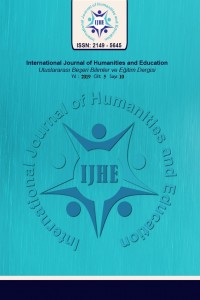Öz
On April 16, 2017, Turkey hosted a historical referendum which attracted
everybody’s attention to the referendum results. The aim of the referendum was
to reveal Turkish population’s opinion regarding the proposed constitutional
amendments which are supposed to accelerate the shift of the country from
parliamentary democracy to presidential autocracy. As the results of referendum
carry historical importance, it is important to interrogate the voting behavior
of Turkish people in this referendum. This paper investigates the relationship
between 2017 Turkish referendum results and higher education level of
population. Multiple regression model has been used to find out whether
people’s education level affected their votes in the referendum. This article
is the first assessment of the plebiscite results by province.
Anahtar Kelimeler
Turkish referendum higher education voting behavior regression analysis
Kaynakça
- “81 ilin belediye başkanları.” n.d. Sabah. Accessed December 12, 2018. https://www.sabah.com.tr/galeri/aktuel/iste-81-ilin-belediye-baskanlari.
- Aytaç, S. Erdem, Ali Çarkoğlu, and Kerem Yıldırım. 2017. “Taking Sides: Determinants of Support for a Presidential System in Turkey.” South European Society and Politics 22 (1): 1–20. https://doi.org/10.1080/13608746.2017.1280879.
- Barro, Robert J. 1999. “Determinants of Democracy.” Journal of Political Economy 107 (S6): S158–83. https://doi.org/10.1086/250107.
- “BDP Lawmakers Join Sister-Party HDP - Turkey News.” 2014. Hürriyet Daily News. April 24, 2014. http://www.hurriyetdailynews.com/bdp-lawmakers-join-sister-party-hdp-65671.
- Bilgin, Hasret Dikici, and Emre Erdoğan. 2018. “Obscurities of a Referendum Foretold: The 2017 Constitutional Amendments in Turkey.” Review of Middle East Studies 52 (01): 29–42. https://doi.org/10.1017/rms.2018.9.
- Esen, Berk, and Şebnem Gümüşçü. 2017. “A Small Yes for Presidentialism: The Turkish Constitutional Referendum of April 2017.” South European Society and Politics 22 (3): 303–26. https://doi.org/10.1080/13608746.2017.1384341.
- “Gençler 7 Haziran’da kime oy verdi?” 2015. 2015. https://t24.com.tr/haber/gencler-7-haziranda-kime-oy-verdi,300157.
- Klimek, Peter, Raul Jimenez, Manuel Hidalgo, Abraham Hinteregger, and Stefan Thurner. 2017. “Election Forensic Analysis of the Turkish Constitutional Referendum 2017.” ArXiv:1706.09839 [Physics, Stat]. http://arxiv.org/abs/1706.09839.
- Papaioannou, Elias, and Gregorios Siourounis. 2008. “Economic and Social Factors Driving the Third Wave of Democratization.” Journal of Comparative Economics 36 (3): 365–87. https://doi.org/10.1016/j.jce.2008.04.005.
- Supreme Election Commission. n.d. “YSK Web Portal.” Accessed December 12, 2018. http://www.ysk.gov.tr/.
- Taşkin, Burcu. 2015. “Voter Turnout in Turkey’s Parliamentary and Local Elections (1950–2014): Does Participation Increase When Competition Decreases?” Turkish Studies 16 (4): 465–86. https://doi.org/10.1080/14683849.2015.1101350.
- Yurtbilir, Murat. 2018. “The Future of Turkish Politics After the Elections - AIIA.” Australian Institute of International Affairs (blog). 2018. http://www.internationalaffairs.org.au/australianoutlook/the-future-of-turkish-politics-after-the-elections/.
- “Turkish Foreign Policy after the Referendum.” 2017. May 17, 2017. http://www.meri-k.org/turkish-policy-consequences-of-the-referendum/.
- TurkStat. n.d. “TurkStat.” Accessed December 12, 2018. http://www.turkstat.gov.tr/Start.do.
- Venice Commission. 2017. “Venice Commission.” 2017. https://www.venice.coe.int/webforms/documents/?pdf=CDL-AD(2017)005-e.
- “What Is at Stake in Turkey’s Referendum.” 2017. 2017. https://www.economist.com/the-economist-explains/2017/04/12/what-is-at-stake-in-turkeys-referendum.
Öz
On April 16, 2017, Turkey hosted a historical referendum which attracted
everybody’s attention to the referendum results. The aim of the referendum was
to reveal Turkish population’s opinion regarding the proposed constitutional
amendments which are supposed to accelerate the shift of the country from
parliamentary democracy to presidential autocracy. As the results of referendum
carry historical importance, it is important to interrogate the voting behavior
of Turkish people in this referendum. This paper investigates the relationship
between 2017 Turkish referendum results and higher education level of
population. Multiple regression model has been used to find out whether
people’s education level affected their votes in the referendum. This article
is the first assessment of the plebiscite results by province.
Anahtar Kelimeler
Turkish referendum higher education voting behavior regression analysis
Kaynakça
- “81 ilin belediye başkanları.” n.d. Sabah. Accessed December 12, 2018. https://www.sabah.com.tr/galeri/aktuel/iste-81-ilin-belediye-baskanlari.
- Aytaç, S. Erdem, Ali Çarkoğlu, and Kerem Yıldırım. 2017. “Taking Sides: Determinants of Support for a Presidential System in Turkey.” South European Society and Politics 22 (1): 1–20. https://doi.org/10.1080/13608746.2017.1280879.
- Barro, Robert J. 1999. “Determinants of Democracy.” Journal of Political Economy 107 (S6): S158–83. https://doi.org/10.1086/250107.
- “BDP Lawmakers Join Sister-Party HDP - Turkey News.” 2014. Hürriyet Daily News. April 24, 2014. http://www.hurriyetdailynews.com/bdp-lawmakers-join-sister-party-hdp-65671.
- Bilgin, Hasret Dikici, and Emre Erdoğan. 2018. “Obscurities of a Referendum Foretold: The 2017 Constitutional Amendments in Turkey.” Review of Middle East Studies 52 (01): 29–42. https://doi.org/10.1017/rms.2018.9.
- Esen, Berk, and Şebnem Gümüşçü. 2017. “A Small Yes for Presidentialism: The Turkish Constitutional Referendum of April 2017.” South European Society and Politics 22 (3): 303–26. https://doi.org/10.1080/13608746.2017.1384341.
- “Gençler 7 Haziran’da kime oy verdi?” 2015. 2015. https://t24.com.tr/haber/gencler-7-haziranda-kime-oy-verdi,300157.
- Klimek, Peter, Raul Jimenez, Manuel Hidalgo, Abraham Hinteregger, and Stefan Thurner. 2017. “Election Forensic Analysis of the Turkish Constitutional Referendum 2017.” ArXiv:1706.09839 [Physics, Stat]. http://arxiv.org/abs/1706.09839.
- Papaioannou, Elias, and Gregorios Siourounis. 2008. “Economic and Social Factors Driving the Third Wave of Democratization.” Journal of Comparative Economics 36 (3): 365–87. https://doi.org/10.1016/j.jce.2008.04.005.
- Supreme Election Commission. n.d. “YSK Web Portal.” Accessed December 12, 2018. http://www.ysk.gov.tr/.
- Taşkin, Burcu. 2015. “Voter Turnout in Turkey’s Parliamentary and Local Elections (1950–2014): Does Participation Increase When Competition Decreases?” Turkish Studies 16 (4): 465–86. https://doi.org/10.1080/14683849.2015.1101350.
- Yurtbilir, Murat. 2018. “The Future of Turkish Politics After the Elections - AIIA.” Australian Institute of International Affairs (blog). 2018. http://www.internationalaffairs.org.au/australianoutlook/the-future-of-turkish-politics-after-the-elections/.
- “Turkish Foreign Policy after the Referendum.” 2017. May 17, 2017. http://www.meri-k.org/turkish-policy-consequences-of-the-referendum/.
- TurkStat. n.d. “TurkStat.” Accessed December 12, 2018. http://www.turkstat.gov.tr/Start.do.
- Venice Commission. 2017. “Venice Commission.” 2017. https://www.venice.coe.int/webforms/documents/?pdf=CDL-AD(2017)005-e.
- “What Is at Stake in Turkey’s Referendum.” 2017. 2017. https://www.economist.com/the-economist-explains/2017/04/12/what-is-at-stake-in-turkeys-referendum.
Ayrıntılar
| Birincil Dil | İngilizce |
|---|---|
| Bölüm | Araştırma Makalesi |
| Yazarlar | |
| Yayımlanma Tarihi | 30 Nisan 2019 |
| Gönderilme Tarihi | 13 Nisan 2019 |
| Yayımlandığı Sayı | Yıl 2019 Cilt: 5 Sayı: 10 |
Uluslararası Beşeri Bilimler ve Eğitim Dergisi
Bu eser Creative Commons Alıntı-Gayri Ticari-Türetilemez 4.0 Uluslararası Lisansı (CC BY-NC-ND 4.0) ile lisanslanmıştır.


